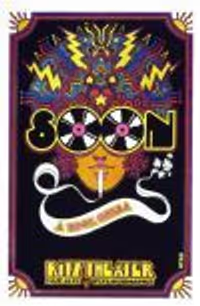Is the Company 2011 Philharmonic DVD still happening?
After Eight
Broadway Legend Joined: 6/5/09
#75Is the Company 2011 Philharmonic DVD still happening?
Posted: 8/14/12 at 2:28am
"I hate when people complain about Sondheim's characters being "unlikeable"--"
And I hate when people won't admit that they are.
"as if likeability should be a factor for who we are willing to watch on stage"
And why shouldn't it be?
#76Is the Company 2011 Philharmonic DVD still happening?
Posted: 8/14/12 at 2:32amYou're a Tennessee Williams fan--one thing we agree on. Would you want to have Stanley Kowalski over for dinner? (Or Blanche, for that matter...)
After Eight
Broadway Legend Joined: 6/5/09
#77Is the Company 2011 Philharmonic DVD still happening?
Posted: 8/14/12 at 3:01am
I'm willing to watch both on a stage.
Not so Fosca, Joanne, Phyllis, Charley.
You said that likability shouldn't be a factor in deciding whom we are willing to see on a stage. I asked you why not? I ask it again. Who are you to tell others what and/or whom they should see or want to see on a stage, and for what reasons?
I want to see the ever likable Dolly Gallagher Levi on a stage. And you're telling me I should want to see Fosca instead?
Sorry, friend, but no.
#78Is the Company 2011 Philharmonic DVD still happening?
Posted: 8/14/12 at 3:02amWhat's wrong with Charley? Frank is the most unlikable character in Merrily.
#79Is the Company 2011 Philharmonic DVD still happening?
Posted: 8/14/12 at 3:05am
I said no such thing. You can have Dolly, I certainly don't object to her, or her being on stage. I guess I don't see why one would object to Joanne and not Stanley Kowalski.
While I didn't spell it out, I think it can be easily seen that what I write is merely my opinion--and for me personally, "likeability", at least as it's often used when refering to fictional characters, is not a factor in whether I find a play compelling or enjoyable. Apparently it is for you--I apologize if I ever seemed to give the impression that my impression speaks for everyone (although, it's funny that you seem to feel I did, because that seems to be something you're often perceived as doing).
sondhead
Broadway Star Joined: 10/25/06
#80Is the Company 2011 Philharmonic DVD still happening?
Posted: 8/14/12 at 3:08am
"and don't get me started about productions that cut Tick Tock..."
You know I've never liked Tick Tock particularly mostly because the music sounds like it is cut from a different cloth. It is schmaltzy and not Sondheim sounding at all. Of course, it was written by David Shire, so the schmaltzy shouldn't really come as a surprise.
What I think is most interesting about the number and the decision of whether or not to use it is the fact that while the standard score licensed by MTI uses the 1995 Broadway Revival score which included Tick Tock, it is listed as optional. In addition to this, productions that elect to use it have to specially request the materials. They are not sent as a part of the standard package. For completeness sake, it should be noted that the script licensed by MTI is actually an amalgam of the 95 Broadway Revival and the 96 London Revival, the latter of which did NOT use Tick Tock. And for that matter the 1970 Broadway original version is also available for licensing as an "alternate orchestration" and needless to say it does include Tick Tock. Regardless, in the "standard" licensed version, Tick Tock is listed as optional, which I feel is a rather clear statement by Sondheim that he at the VERY least approves of the number being cut at the discretion of each individual production, if not recommending that it be.
#81Is the Company 2011 Philharmonic DVD still happening?
Posted: 8/14/12 at 3:15am
I admit, part of my feelings are because I'm a huge dance fan, and it annoys me that the older Sondheim shows seem to increasingly cut whatever dance was included, in revivals (Bolero D'Amour, etc). ANd I like Tick Tock as music, I admit, though I do somewhat understand your objection. I also think that whole sex scene works better with the dance being used.
You mention the 1970 score is available to be licensed--do you know if the original script is an option as well, or is this a situation like Follies (and Merrily, I believe) where only the currently approved version is.
After Eight
Broadway Legend Joined: 6/5/09
#82Is the Company 2011 Philharmonic DVD still happening?
Posted: 8/14/12 at 3:17am
Eric,
Thank you for pointing out that when you referred to "people" and "we" you were only referring to your own preferences. And thank you for so generously letting me "have" Dolly. I'll be similarly generous. You can have Fosca and Joanne. I think I've got the better of the bargain.
Ljay,
Charley is a smug, superior, in-your-face, smartass.
sondhead
Broadway Star Joined: 10/25/06
#84Is the Company 2011 Philharmonic DVD still happening?
Posted: 8/14/12 at 3:59amAs far as I can tell, only the 1970 score/instrument books are materials that MTI can send, leaving the script still the 95/96 rewrite. That's based only on their website, however, so I'm not 100% on this
#85Is the Company 2011 Philharmonic DVD still happening?
Posted: 8/14/12 at 4:05amInteresting. I wonder if any productions use the "fag" lyric anymore...
sondhead
Broadway Star Joined: 10/25/06
#86Is the Company 2011 Philharmonic DVD still happening?
Posted: 8/14/12 at 8:56amI believe the replacement for that is considered official and required no matter which version you're doing. As I recall, the vocal parts they send for that song have the fag lyric in them and then they send an errata sheet saying to change it.
#87Is the Company 2011 Philharmonic DVD still happening?
Posted: 8/14/12 at 11:29am
I hate when they replace 'fag'. HATE. IT.
I also am not a fan of Marry Me a Little as the close to Act 1. I'd very much like to see a Happily Ever After close Act 1.
#88Is the Company 2011 Philharmonic DVD still happening?
Posted: 8/14/12 at 12:11pm
Eh, I'm happy to have no song at the end of Act One. It was the one point in the Philharmonic version (which I saw in the movie theatre) where I got a little bored and my mind started to wander. We know who Bobby is at that point and what he's about, it just seems like padding.
But I'm of the opinion that the show should stay a '70s period piece and use the original orchestrations which have never been remotely equalled.
johnpressman
Chorus Member Joined: 6/24/07
#89Is the Company 2011 Philharmonic DVD still happening?
Posted: 8/14/12 at 1:00pm
What a great discussion! As for the character Joanne's bitchiness, I see that as an outgrowth of womens' frustrations that manifested itself in the Women's Liberation Movement of the late 1960s/early 1970's. With the advent of the birth control pill, women found a new sexual freedom that soon translated to economic freedom.
A woman like Joanne's role in life was to be a wife and mother. Her bitchiness could have been a symptom of the frustration she was feeling as a lady who lunches and nothing more.
I do think trying to adapt "Company" to modern sensibilities (the pot smoking, for instance) diminishes the production. To my way of thinking, "Hair" and "Company" are companion pieces; showing two co-existing generation's respective zeitgeist.
Thank you Gaveston, you are a mensch! By the way, my stepfather was 40 in 1970 and was a NYC Playboy Club keyholder and used to take me there often while I was still underage!
#90Is the Company 2011 Philharmonic DVD still happening?
Posted: 8/14/12 at 1:55pm
I think that's exactly Joanne's problem, John. She's way too smart to have so little to do. No wonder she drinks!
And I'm surprised to hear New York has changed so much since I moved West 27 years ago! When I lived in Manhattan, a Joanne wouldn't have raised an eyebrow. That "I don't suffer fools gladly because I'm rich and I don't have to" attitude was very common in the 1970s. Even among the not so rich.
(Yes, Eric, the Philharmonic version does have at least one birthday party scene in which Joanne is rude to some of the other women, along with the last scene with Bobby. Why is she Bobby's friend? He enjoys her candor AND she picks up the check.)
John, my dad was the South Florida version of your stepfather. Yes, you may shudder. My mother and her family were deeply religious, however, so no Playboy clubs for me. Thank heavens, I think.
#91Is the Company 2011 Philharmonic DVD still happening?
Posted: 8/14/12 at 2:08pm
As for "likability"--which I believe was already the weekly "theme" on THE GLEE PROJECT--characters such as Joanne, Stanley and Richard III give us pleasure because they do and say things we doubt we'd get away with doing or saying. That doesn't mean we would "like" to have them around all the time; but, frankly, I can imagine avoiding Dolly Levi after a few dinners as well: I'll arrange my own life, thank you very much.
Sondheim (with Firth or with others) writes characters he finds interesting; we are free to agree or not.
I don't think he gives a prize for "Miss Congeniality".
#92Is the Company 2011 Philharmonic DVD still happening?
Posted: 8/14/12 at 2:09pmI'd argue that Joanne is not a lady who lunches, but instead is a girl who just watches. That's her frustration. She's not in the lunch set, but she does have money. So...what does she do? If you watch MAD MEN, her equivalent is the former Mrs. Roger Sterling (and that actress would be a dynamite Joanne if she could sing a note).
#93Is the Company 2011 Philharmonic DVD still happening?
Posted: 8/14/12 at 2:21pm
Robbie, I think Joanne HAS to be one of the ladies who lunch. Otherwise, her song has no authority. How would SHE know? (She "watches", I realize, but unless she goes to lunch, she isn't there to watch.)
That being said, I never thought the "girls who just watch" were mutually exclusive to the luncheon group. I think they are a subset. I suspect Joanne saves them for last because that's exactly who she is. (By "last" I mean the last subset to get a full chorus; obviously, "girls on the go" comes later, but I think that's an ironic euphemism for the whole bunch. Joanne knows all too well they aren't really "going" anywhere.)
Updated On: 8/14/12 at 02:21 PM
#94Is the Company 2011 Philharmonic DVD still happening?
Posted: 8/14/12 at 2:44pmJonn Hamm should play Bobby!
#95Is the Company 2011 Philharmonic DVD still happening?
Posted: 8/14/12 at 2:46pm
Well...here you and I differ.
I think Joanne spends much of the song pointing fingers at all the 'girls' in NYC. She starts with the ladies who lunch because they're an object of ridicule to her. As she goes through the list, she circles herself and her kind until she finally points the finger at herself. Why else would that primal yell happen in that verse? As the song comes to a close, she grudgingly gives props to the group of women who came in for the most scorn: the ladies who lunch. Every truly successful version of this song I've ever seen (including *ahem* my own *ahem*) follows this arc. I believe Joanne is someone who travels among many worlds, but who is, first and foremost, a girl who just watches.
#96Is the Company 2011 Philharmonic DVD still happening?
Posted: 8/14/12 at 5:20pm
Robbie, you have the right arc, no doubt about it. Of course the song is ultimately about Joanne; otherwise, it has no impact and why the hell is she singing it so late in the evening?
But the lyric is very carefully structured:
1st chorus: the ladies who lunch (the overall category)
2nd chorus: Subset A-the girls who play smart
3rd chorus: Subset B-the girls who play wife
4th chorus: Subset C-the girls who just watch (Joanne's own subset)
Final chorus: girls on the go (ironic)/ladies who lunch (back to the overall category).
I know you're a smart guy, so we can certainly agree to disagree on this, Robbie. But I don't think the structure of the song supports your argument. If Sondheim had intended "Subset C-the girls who just watch" to be a category mutually exclusive of "the ladies who lunch", he would have written that section as something other than the same chorus as the other subsets. IMO, obviously.
Why does she "grudgingly give props to the ladies who lunch" except that she is among their number? That's what makes her demand that everybody "rise" so raw and moving.
#97Is the Company 2011 Philharmonic DVD still happening?
Posted: 8/14/12 at 5:34pmSee...but I'd have to buy into the fact that all the girls mentioned are subsets of the ladies who lunch. And, though really interesting and totally valid, I'm not sure I agree with that. I always look at that song as a commentary on the different categories of women in New York...not the different subsets of the ladies who lunch. I also don't find anything particularly ironic in the 'girls on the go' lyric. It's one of the most honest moments of the song, stating that the women running about, doing all the can have an innate sense of living on borrowed time. She grudgingly gives props at the end because, in the face of all the upheaval that was the late-60's, the ladies who lunch are the ones who stay truest to themselves...and that there's something valid to that. So what she once mocked as old-fashioned and out of date becomes something eternal...and points to her own shortcomings. (I'd write more and clearer, but I'm heading out of work...I'll try to compose more coherent thoughts another time).
#98Is the Company 2011 Philharmonic DVD still happening?
Posted: 8/14/12 at 5:55pm
Robbie, we should be clear that Joanne is singing about upper-middle class women of New York only. Obviously, she isn't talking about the working class.
In my view, the ladies who lunch are those upper-middle class women. They are the ones with the income and leisure time to have luncheons rather than, say, grabbing a sandwich in between nursing shifts at the hospital.
All of those women have too much money (and often too much education) and therefore too much time on their hands. So they play at improving themselves in dilettante fashion (girls who play smart) or they try to be the perfect spouse and mother (girls who play wife) or they sit and drink themselves into a stupor while making sarcastic comments about the others (girls who just watch).
All of these are "girls on the go", running from their fear of death but really running in circles and going nowhere, i.e., the "ladies who lunch".
OT, but I finally caught Julia Roberts in MONA LISA SMILE, a much better film than I expected. It takes place at Wellesley in 1953-4 and details exactly how the most brilliant women in the country were educated to be the "ladies who lunch". The film portrays Wellesley in that period as a "Joanne training camp".
(I'll shut up on the subject now until you have a chance to respond. I trust that my remarks here convey nothing but respect for you and your views, even when we disagree.)
Updated On: 8/14/12 at 05:55 PM
After Eight
Broadway Legend Joined: 6/5/09
#99Is the Company 2011 Philharmonic DVD still happening?
Posted: 8/14/12 at 6:06pm
"characters such as Joanne, Stanley and Richard III give us pleasure"
"Us," you say?
"Pleasure?"
Joanne?
Well, that's the first time I've ever heard that word associated with that character.
Always a laugh on Broadway World.
Both she and her song are a misogynist's dream come true.
And P.S.
Mad Men is fiction.
The song, too.
Videos







